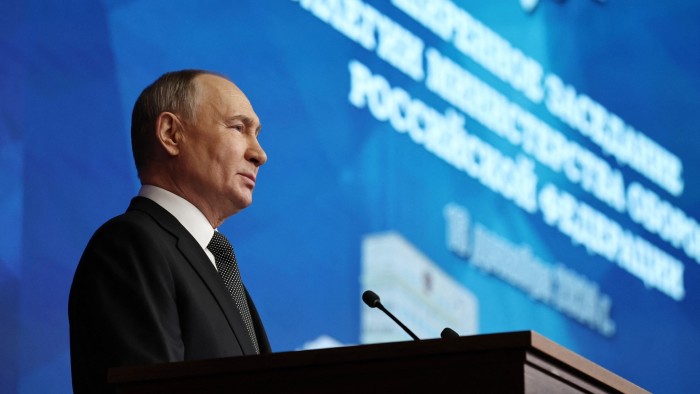Stay informed with free updates
Simply sign up to the War in Ukraine myFT Digest — delivered directly to your inbox.
Vladimir Putin has said Russia may lift its self-imposed restrictions on developing short- and medium-range missiles and would keep its non-strategic nuclear forces on constant combat alert, as he warned that the west was pushing Moscow to “a red line we can’t step back from”.
The Russian president said in a speech to the defence ministry on Monday that he was concerned about the US deploying short- and medium-range missiles abroad and warned that Nato was threatening Russia in Europe and “beyond its historical zone of responsibility” in Asia.
He added that Russia would step up production of hypersonic weapons — such as the new Oreshnik ballistic missile, which it fired at Ukraine for the first time last month — in response to any US deployments of short- and medium-range missiles in Europe and Asia.
Andrei Belousov, appointed defence minister in a reshuffle in May, told the same audience that Russia’s military needed to be ready for medium-term scenarios including “a possible military conflict with Nato in Europe in the next decade”.
European leaders have warned since early this year that Russia is preparing for a broader conflict with the western military alliance beyond its continuing invasion of Ukraine.
But Putin — whose full-scale invasion of Ukraine in 2022 triggered the current confrontation — said talk of a Russian threat to the continent was a “myth” and blamed any escalation on the US and its European allies.
He accused the US of “encouraging the further escalation of the conflict” in Ukraine by arming the government in Kyiv, including with advanced western weapons it has used for strikes deep inside Russian territory.
Putin said Russia had taken the upper hand on the battlefield this year by capturing 189 towns, making 2024 a “landmark in achieving the goals” of the invasion. Russia’s defence industry, boosted by record Rbs13.5tn ($130bn) spending in next year’s budget, had helped bolster Russia’s forces by developing new guidance systems for missiles and producing new kinds of attack drones, he said.
Russia had also managed to sustain its forces by recruiting about 1,000 volunteers a day to fight in the war, Putin said. This year, he added, Russia had recruited 430,000 men compared with 300,000 a year earlier, helping it turn the tide against Ukraine’s outmanned and outgunned forces.
But the current levels of defence spending, Putin acknowledged, could not be raised “to infinity” at the expense of other priorities such as science, education, and healthcare.
The splurge on defence spending has fuelled an economic boom but also sharply increased inflation and created a labour shortage in civilian sectors, with workers attracted by higher salaries in defence factories working three shifts around the clock.
Putin said Russia was taking “additional measures to ensure [our] security and that of our allies” but wanted to avoid getting “dragged into a full-scale arms race at the expense of the social-economic development of our country”.


